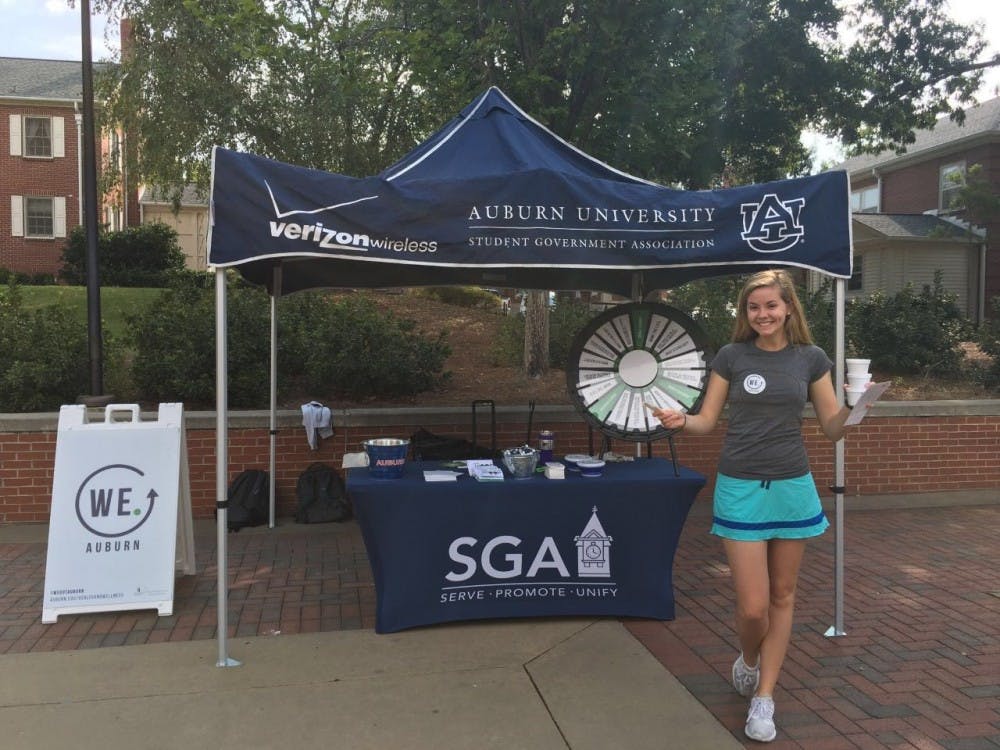The Green Dot Program is an international program that centers around the everyday person and how to effectively react when placed in dangerous or threatening situations.
At Auburn, the program is referred to as WE.auburn, and Melissa McConaha, coordinator of violence prevention and survivor advocacy, helps lead the Green Dot and Safe Harbor programs on campus.
McConaha, along with Sara Gartner, graduate assistant for violence prevention and survivor advocacy provide an inside look at what the programs bring to Auburn.
"Green Dot isn't an organization," McConaha said. "It is a strategy that we are asking people to engage in. That means it is open to literally everyone all over campus at every single level."
In order to be able to train others in the WE.auubrn program, the two women had to go through facilitator training. McConoaha went through training in 2015 while Gartner participated in July 2018.
The WE.auburn program provides two types of training: overviews, which last 15 to 60 minutes and full trainings, which last four hours. They also have trained all the facilities on campus to look out for certain signs and to provide help when needed.
McConaha explained that in full training, participants are involved in a more interactive form of training, which includes brainstorming and practicing different strategies to use in a variety of situations. The overviews help cultivate a sense of urgency and personal responsibility to engage in what are called the Green Dot behaviors.
Gartner said that Green Dots and Red Dots are behaviors, not people. Red Dots are the behaviors that a person sees as a bystander that is potentially causing someone harm.
"It's a bystander-intervention training, so we are training people to be active, safe and empowered bystanders," McConaha said. "We also train them to intervene or provide help when they see potentially problematic situations."
The strategies that Green Dot teaches include direct, delegate, distract and proactive. Each of these help with the situation whether a bystander decides to call officials or intervene by taking the victim out of the situation by acting like they know the victim.
"This could be like stalking, sexual assault, domestic violence, sending threatening text messages, grabbing or hitting a partner," Gartner said. "It's like a whole umbrella of things you could see as a bystander that would make you pause and take a second look."
WE.auburn has a whole host of other functions in addition to training, such as their events to spread their message on the concourse.
"We normally do concourse events each year, which is where we pass out T-shirts, mugs, have games and tell a brief overview of what we do," McConaha said. "Usually, every spring we pass out coffee and doughnuts to help spread the Green Dot message. We also have a 'Get a Scoop' event, which is where we team up with Tiger Dining, who supplies free ice cream for us."
Green Dot also partners with the Student Government Association for Safety Week and has recently partnered with Panhellenic where they provided QPR training and a Green Dot overview for new members this year.
"It only requires two things to join into the messaging of Green Dot: you have to believe violence is not okay, and that everyone has a part to play," Gartner said. "No one has to do one big thing; everyone is just doing small things together."
She also added that Green Dot's slogan is "Harnessing hope into action." McConoaha believes that this slogan taps into the hope that is often left out of the violence-prevention narrative. She mentioned that there are so many people on campus that want to help with their community and with Green Dot's message.
"We always talk about how we are all members of the Auburn Family, which sounds really nice, but it means a lot more when we act like it," McConaha said. "I think Green Dot gives us this shared language to engage in behaviors where we are constantly looking out and taking care of each other like a family."
If any organization, hall or club would like the Green Dot members to teach their message and provide an interview, they can email hpws@auburn.edu.
"We know that violence happens at extraordinary rates and has for decades," McConaha said. "We think it will take a cultural change to make a shift, and we have to make a difference."
Also, WE.auburn is active on the Health and Wellness Instagram, where they have information about upcoming events.
Safe harbor is open 24/7 for students who have been victims of sexual harassment, domestic or dating violence and stalking and harassment. Green Dot and Safe Harbor are located in Suite 1206 in the Student Center.
A free Green Dot training session has been rescheduled for Nov. 4 for those interested.
Correction: A previous version of this piece referred to the brainstorming and practicing of strategies to use in threatening situations as Red Dot behaviors. Strategies that are taught in the program are called Green Dot behaviors. We regret the error.
Do you like this story? The Plainsman doesn't accept money from tuition or student fees, and we don't charge a subscription fee. But you can donate to support The Plainsman.





